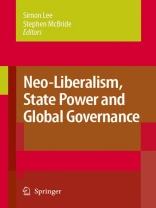This volume explores some of the ways in which neo-liberalism has affected both the exercise of state power and the conduct of global governance in the cont- porary global economy. While the contributors have approached their subject from a variety of social science perspectives, their research is united by a number of underlying themes. First, neo-liberalism has failed to deliver a framework for state power and global governance capable of delivering stability and enduring prosperity. Second, the role of the politics in general, and the state and global governance in particular, should be defined more broadly than the simple neo-liberal construction of institutions for the market. There is an urgent need for the re-balancing of state power and global governance in favour of the public domain of the state and citizenship, in order to redress some of the inequalities bequeathed by three decades of liberalization, privatization, and de-regulation. Third, the degree to which globalization has undermined the policy autonomy of the de- cratic state has been overstated in many cases. While many poorer developing economies have been presented with a developmental fait accompli, for many more affluent polities, neo-liberal globalization has been a deliberate policy choice. As a consequence, any analysis of the impact of neo-liberalism upon state power and global governance must acknowledge the importance of context, including the role played by society, historical traditions, and culture, in mediating the effects of neo-liberalism.
Jadual kandungan
National Differences in the Face of Pressures to Converge.- Introduction: Neo-Liberalism, State Power and Global Governance in the Twenty-First Century.- European Economic Integration: The Threat to Modell Deutschland.- Stranded on the Common Ground?: Global Governance and State Power in England and Canada.- Assessing the Globalization–Decentralization Nexus: Patterns of Education and Reform in Mexico, Chile, Argentina and Nicaragua.- Trans-National Policy Prescriptions.- Tracking Neo-Liberalism: Labour Market Policies in the OECD Area.- Social Economy Policies as Flanking Mechanisms for Neo-Liberalism: Trans-national Policy Solutions, Emergent Contradictions, Local Alternatives.- Assessing the Convergence Thesis of Legal Reforms in Emerging Market Economies.- Labour: A Special Case in the Global Economy?.- Governance, Trade and Labour Mobility.- Neo-Liberal Policies and Immigrant Women in Canada.- The Need for Reform.- The Logic of Neo-Liberalism and the Political Economy of Consumer Debt-Led Growth.- World Trade and World Money: The Case for a New World Currency Unit.- Multilateral Institution-Building in a Neo-Liberal Era: The Case of Competition Policy.- The World Trade Organization and Global Governance.- Human Welfare and the Future of the World Trade Organization: Rethinking the International Institutional Architecture.- The Organization for Economic Co-operation and Development: Meeting the Challenges of the Twenty-First Century?.- Conclusion: The Need to Rebuild the Public Domain.












